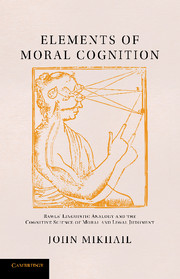 Elements of Moral Cognition
Elements of Moral Cognition Book contents
- Frontmatter
- Contents
- List of Tables and Figures
- Preface
- PART ONE THEORY
- PART TWO EMPIRICAL ADEQUACY
- 4 The Problem of Descriptive Adequacy
- 5 The Moral Grammar Hypothesis
- 6 Moral Grammar and Intuitive Jurisprudence: A Formal Model
- PART THREE OBJECTIONS AND REPLIES
- PART FOUR CONCLUSION
- Appendix: Six Trolley Problem Experiments
- Bibliography
- Index
4 - The Problem of Descriptive Adequacy
Published online by Cambridge University Press: 07 September 2011
- Frontmatter
- Contents
- List of Tables and Figures
- Preface
- PART ONE THEORY
- PART TWO EMPIRICAL ADEQUACY
- 4 The Problem of Descriptive Adequacy
- 5 The Moral Grammar Hypothesis
- 6 Moral Grammar and Intuitive Jurisprudence: A Formal Model
- PART THREE OBJECTIONS AND REPLIES
- PART FOUR CONCLUSION
- Appendix: Six Trolley Problem Experiments
- Bibliography
- Index
Summary
How does it happen that the prevailing public opinion about what is right and what is moral is in so many respects correct? If such a philosopher as Kant failed in the attempt to find the source of our knowledge of right and wrong, is it conceivable that ordinary people succeeded in drawing from this source? And if it is not, how does it happen that they have so often arrived at the proper conclusions without having the necessary premises? One cannot possibly explain the fact by saying that the correct view was established long ago. … But this difficulty's easily resolved. We only have to reflect that much of what is present in our store of knowledge contributes toward the attainment of new knowledge without our being clearly conscious of the process. … Thus it has often been observed that for thousands of years men have drawn right conclusions without bringing the procedure and the principles which form the condition of the formal validity of the inference into clear consciousness by means of reflection. … In spite of their false conception of the true fundamental principles, these still continue to operate in their reasoning. But why do I go so far for examples? Let the experiment be made with the first “plain man” who has just drawn a right conclusion, and demand of him that he give you the premises of his conclusion. […]
- Type
- Chapter
- Information
- Elements of Moral CognitionRawls' Linguistic Analogy and the Cognitive Science of Moral and Legal Judgment, pp. 77 - 100Publisher: Cambridge University PressPrint publication year: 2011


